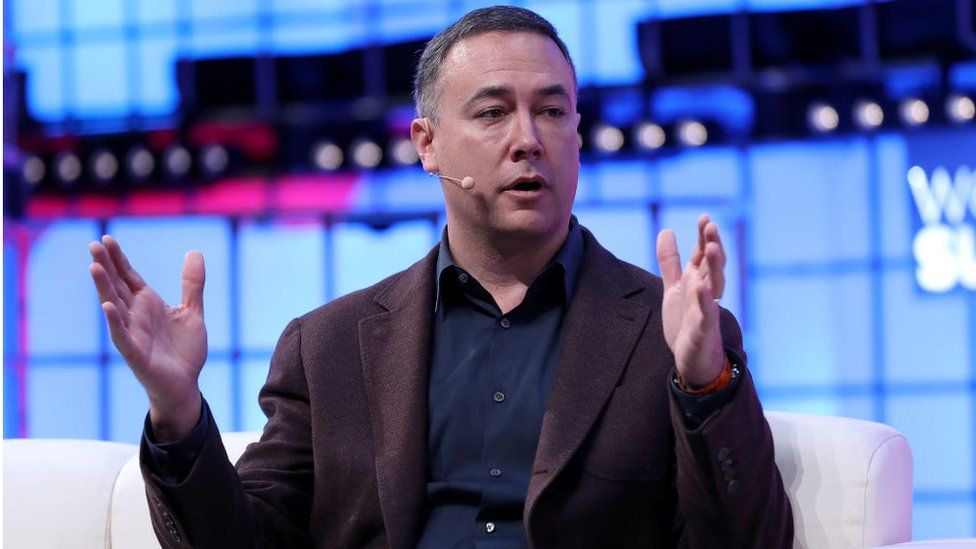Tinder's signature "swipe left, swipe right" approach to match-making is no longer enough to satisfy singles used to lockdown dating, its CEO has said.
People used to match in order to meet in real life, Jim Lanzone told the BBC – but that changed when virtual dating became the norm in lockdowns.
Now the dating app is shifting towards more "holistic" profiles so users can get to know each other better online.
New changes reflect their desire to "swipe possibly", Mr Lanzone said.
In his only UK interview ahead of changes to the app, the 50-year-old boss told the BBC the trend was especially evident among Gen Z users in their late teens and early 20s – who now make up more than half of the app's users.
"As we know from the past 15 to 18 months, people have really leaned in to getting to know people virtually, even having relationships virtually, before they take those relationships offline," Mr Lanzone said.
"The larger trend here is that people on Tinder coming out of Covid… they just want to slow things down and get to know people first a lot more before they decide to match, let alone before they decide to go meet someone offline. "
- 'We started going out in the first week of lockdown'
- How lockdown helped this long-distance couple
Tinder's data suggests the average number of messages sent per day is up 19% compared to before the pandemic – and conversations are 32% longer.
Half of Gen Z users have had dates via video chat, and a third did more virtual activities together, the company says.
Changes being rolled out this week will still give users the option to swipe right on someone else's profile if they like the look of them, and swipe left if they are not interested.
However they will also have "more tools to show a more multidimensional version of themselves," according to Mr Lanzone, who is based in San Francisco and became CEO of Tinder during the pandemic last year.
They include the option to add videos to profiles and to search for modes in an "explore hub" to tailor the type of profiles shown. For example, users could say they want to find people who have pets or like adventures.
 Image source, Getty ImagesImage caption, Jim Lanzone was previously president and CEO of CBS Interactive
Image source, Getty ImagesImage caption, Jim Lanzone was previously president and CEO of CBS Interactive
For the first time, they will have the option to chat with someone before matching, using a feature that asks them to give their "hot take" or opinion on a topic.
Other dating apps – such as Hinge, which is owned by the same company as Tinder, and Bumble – already ask users to respond to questions as well as posting pictures.
Mr Lanzone said these apps served people looking for "a serious relationship" – which is a "different stage in life" to people in their 20s who are "open to a wider range of possibilities".
Asked whether Tinder was more of a hook-up app while Hinge was for forming relationships, he said: "I wouldn't be able to speak to that directly. Different apps, different companies."
Tinder's decision to focus more on video comes as TikTok's popularity continues to grow. ByteDance, the Chinese company behind the smash-hit video app, saw its earnings double last year.
- TikTok owner ByteDance sees earnings double
- The tech billionaire who is putting women first
Mr Lanzone said members of Gen Z – often categorised as those born between 1997 and 2015 – "live in video" and he expected that Gen Z Tinder members would continually update their profiles, rather than sticking with the same set of videos and pictures.
Tinder's data suggests younger users value "authenticity" and openness in a partner, with more mentions of mental health and values in their bios during the pandemic – including the words "anxiety and "normalize".
"Part of being more authentic is trying to be less of a perfectionist about the thing you're sharing and keeping it updated about what's happening in your life," Mr Lanzone said.
He insisted that Tinder was not going to become a social media platform, and – unlike rival app Bumble – would not go down the route of helping users form platonic friendships.
However, he said the pandemic had thrown people off the linear dating trajectory which, in principle, involved swiping, matching, meeting for a date, having a relationship and getting married.
"First of all it started to lead to things like video chat because you couldn't meet somebody in real life. But then last summer as things started to open up a little bit before the next wave hit, the trend became very quickly not 'let's meet for a drink' but 'let's go hiking'," he said. "People were deciding to go for adventures together."
There is "a lot more" to getting to know someone "than just matching and having a quick chat before you then meet offline," he added.
"I think it's time that we give people more tools to show a more multidimensional version of themselves."

Has your approach to dating changed during Covid? Share your experiences by emailing [email protected].
Please include a contact number if you are willing to speak to a BBC journalist. You can also get in touch in the following ways:
- WhatsApp: +44 7756 165803
- Tweet: @BBC_HaveYourSay
- Please read our terms & conditions and privacy policy
If you are reading this page and can't see the form you will need to visit the mobile version of the BBC website to submit your question or comment or you can email us at [email protected]. Please include your name, age and location with any submission.
